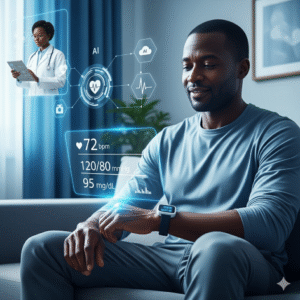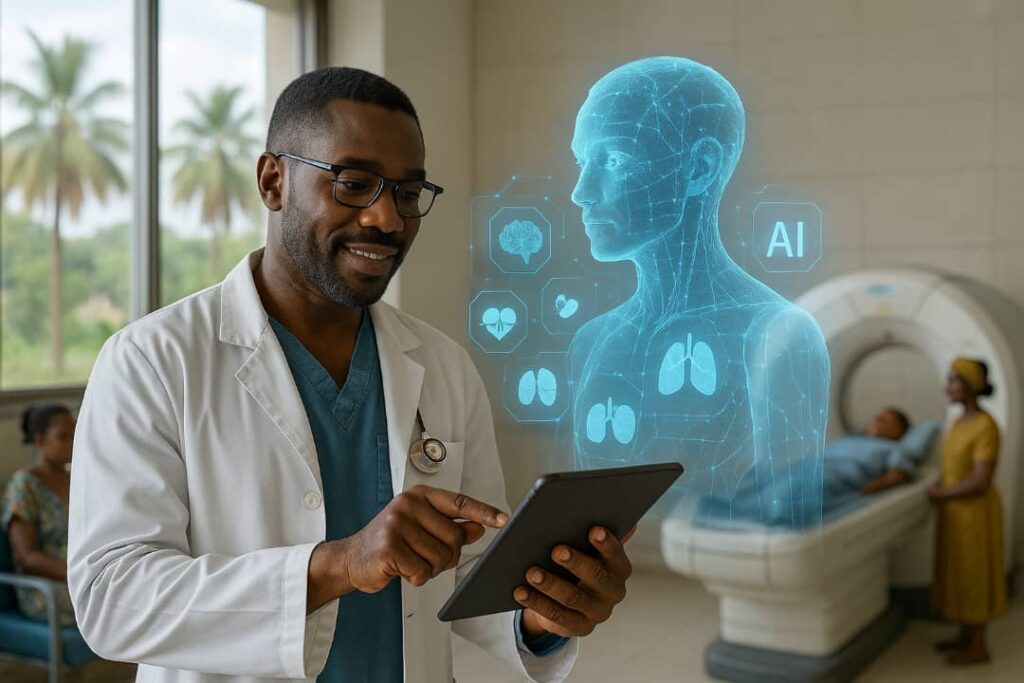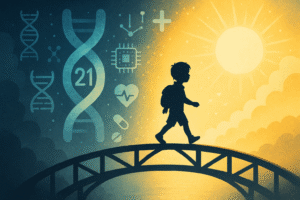
Artificial Intelligence: A Healthcare Revolution in Africa.

A Healthcare System in Crisis, a Glimmer of Technological Hope
Africa is grappling with an unprecedented health crisis, marked by a severe shortage of medical resources. According to the World Health Organization (WHO), while the continent houses 17% of the global population, it possesses only 3% of the world’s health professionals. This disparity is particularly acute in countries like Malawi and Niger, where there are approximately 0.49 and 0.3 physicians per 1,000 people, respectively, compared to a European average of 3.9 per 1,000 . Such shortages lead to delayed diagnoses, inadequate care, and preventable deaths from treatable conditions.
The challenges are multifaceted. High healthcare costs push over 200 million Africans into poverty annually . Only 20% of hospitals have computerized patient record systems, and 60% of the rural population lacks access to specialized care. In this challenging context, Artificial Intelligence (AI) emerges as a promising solution, offering unprecedented opportunities to improve diagnostics, optimize limited resources, and ultimately save lives.
AI in Action: Concrete Medical Applications Saving Lives
Rapid and Accurate Cancer Screening in Africa: Reducing Errors and Accelerating Diagnoses
Cancer poses a significant public health challenge in Africa, with 70% of cases diagnosed at advanced stages, drastically reducing survival rates. AI offers innovative solutions by enabling faster and more accurate analyses of medical examinations.
In Nigeria, Lagos University Hospital implemented an AI algorithm for mammogram analysis, achieving a 92% accuracy rate, surpassing the 75% accuracy of overburdened human radiologists. This led to a 40% increase in early diagnoses and a 30% reduction in diagnostic errors.
In South Africa, Google DeepMind developed a model capable of detecting breast cancer in histological images with a record 99% accuracy, matching the performance of top specialists. This advancement is particularly significant given the shortage of qualified pathologists.
Combating Infectious Diseases: Malaria and Tuberculosis
Malaria continues to devastate Africa, causing over 600,000 deaths annually. In Ghana, the company Zipline developed an innovative solution combining drones and AI to identify epidemic hotspots through satellite and climate data analysis, enabling targeted delivery of antimalarials in under 30 minutes to the most remote areas. This approach has already led to a 20% reduction in mortality in covered regions.
Tuberculosis, another major health threat, also benefits from AI advancements. In South Africa, where 360,000 new cases are reported annually, an algorithm developed by Google DeepMind analyzes chest X-rays with a 95% accuracy rate, surpassing the 65% accuracy of often overburdened general practitioners. This technology not only allows for faster detection, limiting disease spread, but also significantly reduces costs associated with late diagnoses.
“An AI model identified a drug-resistant tuberculosis strain in Kenya, preventing a local outbreak.” – The Lancet Digital Health (2023)
Preventing Eye Diseases: Avoiding Blindness with AI
Diabetic retinopathy, the leading cause of blindness among working-age adults in Africa, remains largely underdiagnosed. According to the International Diabetes Federation (2023), 80% of cases are not detected in time due to a severe shortage of ophthalmologists—sometimes as few as one per million inhabitants—and limited access to specialized examinations.
In Rwanda, in partnership with Google Health, a pioneering automated screening program was launched in 2020. The process involves three key steps: collecting retinal images using portable cameras in rural health centers, instant analysis by a deep learning algorithm capable of detecting characteristic lesions in under 10 seconds, and rapid management of critical cases via an SMS alert system.
The results are particularly encouraging: a 50% reduction in late diagnoses since 2021, an increase in screened patients from 5,000 in 2019 to 30,000 in 2023, and a fivefold reduction in costs compared to traditional methods. This success paves the way for expanding the approach to other eye diseases and countries across the continent.Challenges of AI in African Healthcare: Structural Obstacles and Local Innovations
Infrastructure and Digital Data Challenges
The lack of digital infrastructure is a major obstacle to deploying AI in African healthcare systems. Currently, only 20% of hospitals on the continent have computerized systems for managing patient records, according to the World Bank (2023). This situation creates a critical shortage of digitized medical data, essential for training AI algorithms.
An additional problem lies in the inadequacy of AI models developed in Western countries. A study published in Nature Medicine (2022) revealed that these algorithms, primarily trained on Caucasian data, have error rates of up to 35% when applied to African patients. This disparity is due to notable physiological and epidemiological differences.
The fragmentation of healthcare systems between public, private, and informal sectors further complicates the aggregation of data necessary for developing AI solutions tailored to the African context.
Emerging Innovative Solutions
In response to these challenges, several promising initiatives are emerging across the continent:
- The Kenyan startup AfricAI developed a collaborative platform bringing together 47 hospitals across 12 African countries. This initiative has created an anonymized database containing over 250,000 typically African medical images, covering diseases like malaria and sickle cell anemia. AI models trained on this local data show a 40% improved accuracy compared to imported solutions.
- WHO Africa is working simultaneously on standardizing information systems through the African Health Data Model (AHDM) protocol. This pilot project, deployed in five countries (Rwanda, Ghana, Senegal, Ethiopia, and South Africa), offers financial incentives to health facilities, with a 15% budget increase for those adopting full digitization of patient records.
- Alternative mobile data collection solutions are also developing. In Nigeria, the MedScan app allows digitization of paper X-rays using simple smartphones. In the Democratic Republic of Congo, the mHero system transforms SMS messages into structured data for epidemic monitoring.
Connectivity Challenges
Limited internet access represents another major obstacle, with approximately 600 million Africans lacking a stable connection, according to the GSMA (2023). This situation often makes it impossible to use cloud-based AI tools, particularly for real-time medical image analysis.
” Offline First” Innovation
This constraint has spurred the development of ingenious solutions that operate without a permanent internet connection:
- In the Democratic Republic of Congo, the AI4DR device is a portable case powered by solar battery for 48 hours. This system, costing only $200, analyzes chest X-rays with a 94% sensitivity for detecting tuberculosis. Its success is such that it is now exported to the Brazilian Amazon.
- The Zipline drone service, deployed in Ghana and Rwanda, now integrates TensorFlow Lite chips enabling 100% autonomous operation. These drones can predict stock shortages and optimize their routes in real-time using Lora WAN networks, without relying on a conventional internet connection.
- In Mali, Raspberry Pi micro-servers installed in health huts allow local storage of medical data, with nightly synchronization when the connection becomes available. This “Analyze → Local Storage → Deferred Transmission” approach represents a model adapted to African constraints.
Towards Improved Connectivity
Several projects aim to enhance connectivity in health centers:
- In Senegal, the Bokku project develops community mesh networks using WiFi antennas made from electronic waste. Simultaneously, the partnership between SES and Orange offers satellite internet access for $5 per month, specifically designed for health facilities.
- The AfriChain health blockchain offers another interesting avenue, enabling secure exchange of medical data between hospitals via local nodes, without requiring centralized internet connectivity.
A Global Innovation Laboratory
These constraints specific to the African context have paradoxically led to the development of more robust and cost-effective solutions than those in developed countries. As Dr. Aisha Bello, founder of AI4DR, notes: “In Europe, AI aims for performance. In Africa, it must first function without electricity or internet.”
This reality positions Africa today as a true laboratory of innovation in frugal AI applied to healthcare.
Dr. Amina, oncologist in Nigeria: “Since integrating AI into our breast cancer screening process, we’ve seen a significant increase in early diagnoses, greatly improving our patients’ survival rates.”
Ms. Kofi, Ghanaian patient: “Thanks to the AI-based monitoring system, I received antimalarial treatment quickly, avoiding serious complicatio
To realize this potential, three essential conditions must be met. Significant investments in digital infrastructure are indispensable. Active involvement of local stakeholders through training programs and collaborative initiatives is equally crucial. Finally, adapting regulatory frameworks will allow for the reconciliation of technological innovation and patient data protection. The commitment of all stakeholders—governments, the private sector, the medical community, and civil society—will be decisive in successfully achieving this digital transformation of healthcare in Africa.
Did You Know?
By integrating tailored AI solutions, some African countries have already halved diagnostic delays and increased access to specialized care in rural areas sixfold. These successes are just the beginning.
Keywords:
Health crisis, physician shortage, access inequalities, hospital infrastructure, healthcare costs, preventable mortality, rural health system, late diagnosis, underdiagnosis
Sources:
World Bank
WHO | Regional Office for Africa:
African Development Bank Group
Artificial Intelligence for Development
AFD:
United Nations


